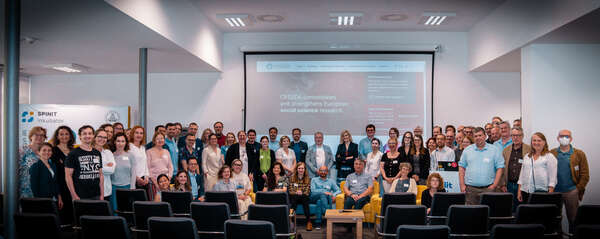
CESSDA Conference Science Day 2024: Key Takeaways and Highlights
On 12 June 2024, the CESSDA (Consortium of European Social Science Data Archives) Conference Science Day convened a series of insightful sessions addressing contemporary challenges in data collection within the social sciences. The conference brought together experts from various countries to discuss topics ranging from data preservation in crisis situations to metadata interoperability. It took place at the UNIST Technological Park in Split, Croatia.
A Snapshot of Contemporary Challenges in Data Collection in the Social Sciences
The day began with a number of welcoming speeches. Matthias Reiter-Pázmándy (Federal Ministry of Education, Science and Research of Austria; Vice-Chair of CESSDA General Assembly) welcomed the participants on behalf of CESSDA, Helena Laaksonen (FSD, Chair of CESSDA General Assembly) on behalf of the National Service Providers, and Jelena Ilić-Dreven (Ministry of Science and Education, Croatia) on behalf of the host country. This was followed by an overview of the day’s agenda presented by Bonnie Wolff-Boenisch, (Director of CESSDA).
The first session was chaired by Dimitra Kondyli (EKKE, Greece) and Yana Leontiyeva (CSDA, Czech Republic). This session highlighted the multifaceted challenges faced in data collection, particularly in emergency situations. Olga Zhmurko (Kyiv Data Archive) discussed the preservation of data in Ukraine amidst military threats, emphasising the importance of international cooperation and the necessity of bringing Kyiv’s archive procedures up to CESSDA standards. Tuba Bircan (VUB, Belgium), explored immigration data and the gaps in migration studies, underscoring the complexities involved in defining the umbrella term migrant and the significance of reliable big data for policy-making. Frederic Sgard (OECD Global Science Forum) shared lessons learned from the COVID-19 pandemic, stressing the need for immediate and coordinated responses from data infrastructures to be prepared for future crises. Helena Laaksonen,(Chair of CESSDAs General Assembly and FSD, Finland) responded on behalf of CESSDA, advocating for proactive funding, overcoming regulatory barriers, to prepare data infrastructures for future emergencies.
The Work of Trustworthy Repositories with a Focus on Sensitive Data
The second session, chaired by Ricarda Braukmann (DANS, Netherlands), delved into the standards and practices necessary for handling sensitive data within trustworthy data repositories (TDR). Hervé L’Hours from (UKDS, UK) discussed TDR standards and the importance of transparency and safety in managing sensitive data. Jiří Kocián (on behalf of SSHOC/CLARIN; the Malach Centre for Visual History, Czech Republic) highlighted the challenges of managing vast amounts of personal data, particularly Holocaust survivors’ testimonies, and the need for clear access rules and metadata synchronisation. Libby Bishop (GESIS, Germany) and Brian Kleiner (FORS, Switzerland) shared findings from a survey on the conditions and challenges of preserving sensitive data across CESSDA Service Providers, emphasising the importance of trustworthiness and collaboration. Darren Bell (UKDS, UK) presented a future outlook on the infrastructure transformation needed to handle sensitive data, stressing the need for standardisation and investment in better upstream metadata.
Metadata Interoperability to Advance Interdisciplinary Research
The final session, chaired by Darren Bell, focused on enhancing interdisciplinary research through metadata interoperability. Simon Hodson (CODATA, the Committee on Data of the International Science Council) introduced the WorldFAIR project and CDIF (the Cross-Domain Interoperability Framework), which aims to improve data policies, data science, and training for interdisciplinary research. Hilde Orten (Sikt, Norway), discussed the SSHOC-ENVRI collaboration on Smart Cities, highlighting the integration of social and environmental data. Wolmar Nyberg Åkerström (ELIXIR representative from NBIS, Sweden) and Clement Jonquet (INRAE, France) contributed insights on semantic interoperability and FAIR-IMPACT’s contributions to metadata and ontologies within EOSC. The roundtable discussions addressed the practicalities of developing interoperable metadata standards and the importance of interdisciplinary collaboration.